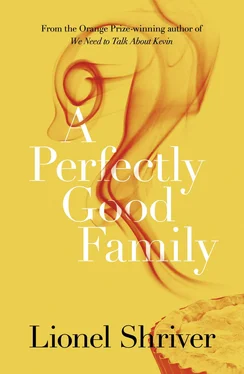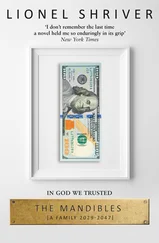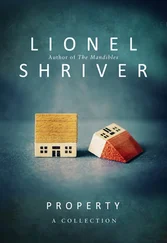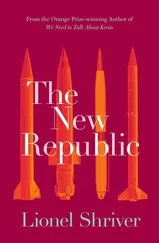Mordecai, however, couldn’t keep seated. He was buoyant. “This is a bang-up idea.” He fanned the photocopy, his three pigtails wagging across his leather vest. “Christ, we wouldn’t want what happened to Grandmother to happen to you guys. She just lay there for years, it must have cost a fortune! And insurance doesn’t always cover it, you know. Exceed the liability, that’s it, you sell the house, liquidate assets, a whole life’s savings down the IV tube.”
At the mention of “sell the house”, Truman’s eyes had shot black.
“You know,” Mordecai went on, “sometimes photocopied signatures don’t hold up in court. You want to re-sign my copy? I’ll keep the form in my deposit box. Wouldn’t want it to get misplaced, right?”
Allowing one corner of his mouth a spasm of incredulity, my father scrawled on Mordecai’s copy Sturges Harcourt McCrea , disdainfully illegible; my mother penned her neat initials, EHHM , wincing.
She bent to refill our coffee cups from the thermos and offered me another biscuit; my father scowled over The Christian Century —anything to avoid glancing at their eldest son. Before Mordecai lunged ebulliently to the door, one more time he sauntered to the Britannicas and caressed them, intoning, “The new edition is nowhere near as comprehensive.”
“You got the feeling,” Truman recalled, “that Mordecai would speed his army truck across town, running lights, in order personally to whip the life support from its socket the moment either of them drifted into a light sleep.”
I conceded reluctantly, “He didn’t want them to waste his money on their hospital bills.”
“Mordecai is crass,” said Averil.
It was an ugly word. “He’s thoughtless,” I tempered. “A little avaricious, and he’s always broke.”
“He’s crass .” Quiet and verbally economical, my sister-in-law seemed to have been searching for years for the right adjective, which she would not relinquish, like a prize.
“As for the encyclopedias,” said Truman, “it’s not that I want them, I just don’t want Mordecai to get them. They’re yours, Corlis, if you like. Though I doubt you’d want to pay to box and ship them all the way to England. Nuts, you know, nobody’s unshelved one in my lifetime.”
Now I understood why I was nervous. There was something Truman hadn’t twigged yet, hardly his fault: I hadn’t told him. On the issue of the twenty black volumes, though, I wasn’t fooled. Truman was no anti-materialist. It wasn’t that he didn’t care about things, but that he cared about only one thing, in comparison to which the Britannicas were a trifle.
I had Truman lug my bags to my old room on the second floor, one of seven spacious bedrooms, two with alcoves for handmaids—Heck-Andrews had been built in an era of visitors with hatboxes who came to stay for weeks. In fact, the house so exceeded our needs that my father had threatened to let out extra bedrooms to low income or homeless families. Through our childhoods Truman and I would plot the pratfall of beastly unwashed ruffians who were going to smell up the room next to mine and break all our toys. We should have relaxed. Yes, Sturges McCrea was sheepish about a mansion whose semi-attached carriage house had accommodated not only the original kitchen, but, in a fraction of the area, more servants than the main structure housed masters by half, when he helped found the SCLC. But Father’s guilty magnanimity never put him to personal inconvenience. He paid lip service, for example, to the equality of women, but never encouraged my mother beyond her part-time volunteer work to get a job, lest her distraction delay his supper. There had never been real danger of scruffy truants ransacking our cupboards while we were at school; my father didn’t like children any more than we did.
Rather than board the less fortunate, two bedrooms were converted to studies (my mother’s half the size of her husband’s and doubling as the sewing room). At twenty-one, Truman had deserted his old lair next to mine for his renovated aerie on the third floor. Mordecai’s former bedroom at the front (strategically placed opposite my parents’) had many years ago been shorn of its Jimi Hendrix posters, the nail holes gloppily plastered with my father’s usual ineptitude, the funk of unlaundered jeans and surreptitious fags air-freshened away; by the time he turned fifteen they’d realized he was not coming back. I was disheartened when they cleaned his desk of SDS handouts, because I used to sneak into his vacated hovel and pocket treasures. At twelve, when I scrounged the Peace armband from his closet and blithely displayed it binding my peasant blouse as I waltzed out the back door, my mother had shrieked, her cheeks streaking, that I was becoming “just like my older brother!” This, I was led to believe, was the worst thing that could happen to anyone.
Three halls formed a peg-legged H around the stairwell and master bathroom, down the longest of which I lingered as Truman fetched my carry-on. The hall was narrow with a window at the end, the floor slick enough to play Slippery Slidey in socks, indoor skiing with a running start that my mother discouraged because we reliably embedded splinters into our feet. I noted that Truman had replaced the rotting boards that had skewered us, a neat job. Truman inherited all the physical meticulousness that had skipped a generation with my father.
I peeked into the last left-hand door, slammed in my face enough times. I switched on the overhead light, to find a bland bedspread and stark surfaces: no international gewgaws here. I walked to Mordecai’s desk, where the booze-bottle rings and reefer burns had been lemon-oiled into the past. The drapes were pulled back—replaced, since Mordecai had caught one of his old set on fire—while in his heyday they were always tightly drawn, even on the brightest of summer days. I scanned the blank walls and bare boards, but aside from the painted-over lumps of lousy spackling and the discernible scrapes in the floor from when my brother would shove his desk over to barricade the door, I detected no trace of Mordecai Delano McCrea. In my own room, midis drooped in my wardrobe, plastic horses spilled from its top shelf, my first clumsy attempts at clay sculpture humbled me on my bureau. Yet here was a malicious erasure. Not a single test tube from his chemistry set rolled in a dresser drawer, and all the old Hermann Hesse paperbacks had been bagged and sent off to Goodwill. No stranger would imagine this had ever been anything other than a guest room. As I sometimes fudged to a Londoner that I was born in New York, I wondered if my parents had indulged the pleasant fiction with the odd out-of-towner that they had only two children.
My footfalls rang hollow back down the hall. I had this entire floor to myself: a drastic privacy I had craved as an adolescent, yearning for evenings like this one when my parents would disappear. Now that I had got what I wished I didn’t want it, which goes to show there is no pleasing some people. When my father was alive Mahler and Ives thrummed through this mansion all the way to the tower deck, but with no symphonic bombast tyrannizing the stairwell, no more “Tommy” pounding from down the hall, no lilting alto of “I am a Poor Wayfaring Stranger” wending from the kitchen while my mother made pies, this cavernous structure was deathly quiet, and I was grateful for so much as the thump of my case as it fell from Truman’s exhausted hand, and even for the piping of my sister-in-law, whose nasal, peevish voice would ordinarily annoy me.
As Truman lumbered up the next flight to grill chicken thighs, I shouted after him. “Why are you cooking up there? You’ve an enormous kitchen downstairs, and your kitchen is a closet.”
Читать дальше












